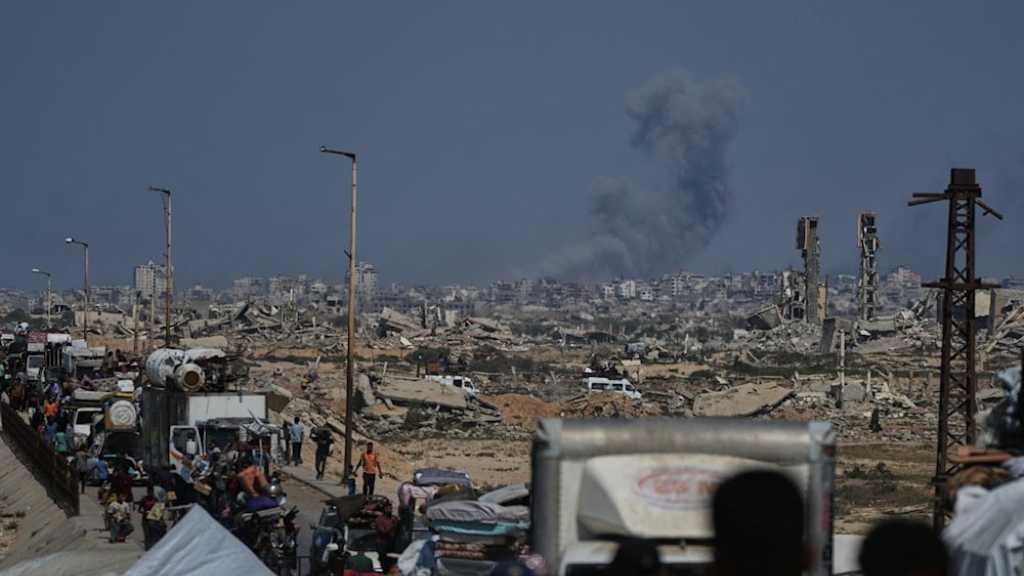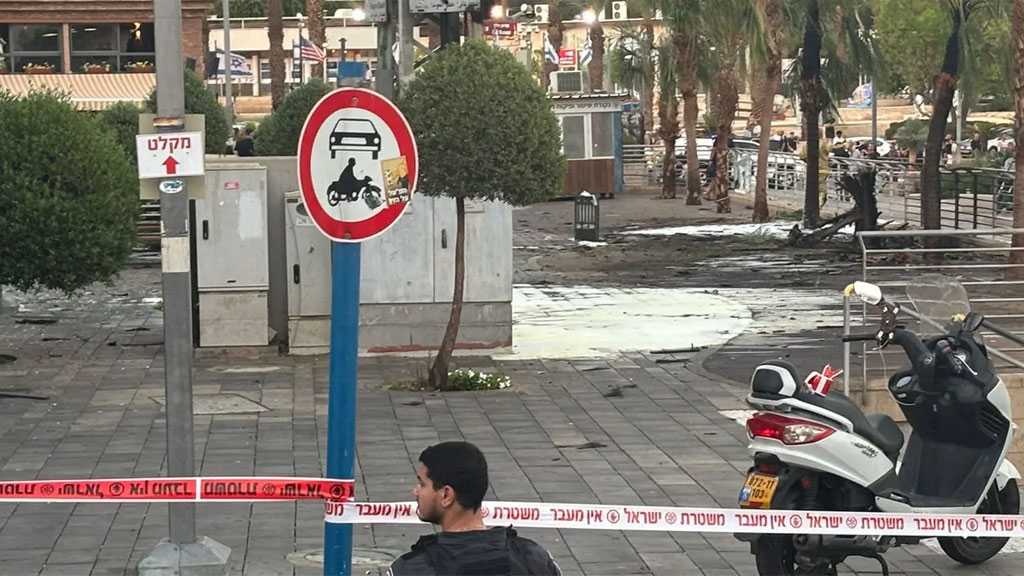Retreating Olmert lowers Zionist dream ceiling

Olmert: West Bank, East 'Jerusalem' (occupied al-Quds) price of peace
Source: AFP/Daily Star, 30-09-2008
OCCUPIED 'JERUSALEM' (OCCUPIED AL-QUDS): Prime Minister Ehud Olmert said 'Israel' must give up almost the entire Occupied West Bank including East 'Jerusalem' as the price for peace with the Palestinians, in an interview published on Monday. "What I am saying to you now has not been said by any 'Israeli' leader before me," Olmert told the Yediot Ahronot in what was widely seen as the political testament of an outgoing leader left with only limited powers.
"We have to reach an agreement with the Palestinians, the meaning of which is that in practice we will withdraw from almost all the territories, if not all the territories," said Olmert, who heads a transitional government following his September 21 resignation.
"We will leave a percentage of these territories in our hands, but will have to give the Palestinians a similar percentage, because without that there will be no peace," he said.
"Including in 'Jerusalem'," he said, referring to the mainly Palestinian-Arab eastern part of the city which 'Israel' occupied and annexed after the 1967 Middle East war and which Palestinians
want as the capital of their future state.
Olmert's comments may spark deep controversy. 'Israel' officially considers 'Jerusalem' its "eternal, undivided" capital.
Giving up parts of the city is key to 'Israel's' security, he said, pointing to deadly July attacks by
Palestinians from East 'Jerusalem' who ploughed through crowded streets with bulldozers.
"Whoever wants to hold on to all of the city's territory will have to bring 270,000 (Native Palestinians) Arabs inside the fences of sovereign 'Israel'. It won't work," Olmert said. "A decision has to be made. This decision ... contradicts our natural instincts, our innermost desires, our collective memories, the prayers of the Jewish people for 2,000 years."
"I am not trying to justify retroactively what I did for 35 years. For a large portion of these years, I was unwilling to look at reality in all its depth," he said.
Yediot Ahronot said Olmert "admits that he erred in his foreign-policy views and actions for decades."
Palestinian negotiator Saeb Erekat said 'Israel' must "translate these statements into reality" if it really wants peace.
"We haven't seen ... a concrete offer," he told AFP, saying "the road to peace is through ending the occupation and 'Israeli' settlements in the West Bank."
While little visible progress has been made since the peace process was revived last year, Olmert was convinced "we are very close to an agreement."
He said that also applies to indirect negotiations with longtime foe Syria that were relaunched in May after an eight-year hiatus, with Turkey acting as go-between.
Peace will come at a price for both sides, with 'Israel' giving up the annexed Golan Heights and Syria must end its support of regional "terrorism," he said.
Olmert submitted his resignation on September 21 following graft allegations that caused police to recommend criminal charges. He will remain interim premier until a new government is formed.
The Olmert interview coincided with a UN report released Monday which stated that the number of barriers and other restrictions preventing the free movement of persons and goods in the 'Israeli'-occupied West Bank continue to increase.
A total of 630 roadblocks, earth-mounds, fences or other types of barriers block internal Palestinian movement in the West Bank, the UN Office for the Coordination of Humanitarian Affairs (OCHA) said in a survey.
This represents a net increase of 19 obstacles since early May, even though the 'Israeli' Army has eased movement in some areas of the Palestinian territory, OCHA said.
The total number of obstacles reported does not include the 69 located in the 'Israeli'-controlled area of the West Bank city of Hebron (al-Khalil), it said.
In addition, almost three quarters of the main routes leading into the 18 most populated urban centers in the West Bank are either blocked or controlled by a military checkpoint.
'Israel' claims the measures are crucial in preventing attacks on 'Israel' and on 'Jewish' (Zionist) occupation settlers in the West Bank.
But OCHA said the policy implemented over the past eight years "once justified by the 'Israeli' authorities as a short-term military response" to violence involving 'Israeli' settlers, "appears to be developing into a permanent system; a system which is fragmenting the West Bank territory and affecting the freedom of movement of the entire Palestinian population."
Source: AFP/Daily Star, 30-09-2008
OCCUPIED 'JERUSALEM' (OCCUPIED AL-QUDS): Prime Minister Ehud Olmert said 'Israel' must give up almost the entire Occupied West Bank including East 'Jerusalem' as the price for peace with the Palestinians, in an interview published on Monday. "What I am saying to you now has not been said by any 'Israeli' leader before me," Olmert told the Yediot Ahronot in what was widely seen as the political testament of an outgoing leader left with only limited powers.
"We have to reach an agreement with the Palestinians, the meaning of which is that in practice we will withdraw from almost all the territories, if not all the territories," said Olmert, who heads a transitional government following his September 21 resignation.
"We will leave a percentage of these territories in our hands, but will have to give the Palestinians a similar percentage, because without that there will be no peace," he said.
"Including in 'Jerusalem'," he said, referring to the mainly Palestinian-Arab eastern part of the city which 'Israel' occupied and annexed after the 1967 Middle East war and which Palestinians
want as the capital of their future state.
Olmert's comments may spark deep controversy. 'Israel' officially considers 'Jerusalem' its "eternal, undivided" capital.
Giving up parts of the city is key to 'Israel's' security, he said, pointing to deadly July attacks by
Palestinians from East 'Jerusalem' who ploughed through crowded streets with bulldozers.
"Whoever wants to hold on to all of the city's territory will have to bring 270,000 (Native Palestinians) Arabs inside the fences of sovereign 'Israel'. It won't work," Olmert said. "A decision has to be made. This decision ... contradicts our natural instincts, our innermost desires, our collective memories, the prayers of the Jewish people for 2,000 years."
"I am not trying to justify retroactively what I did for 35 years. For a large portion of these years, I was unwilling to look at reality in all its depth," he said.
Yediot Ahronot said Olmert "admits that he erred in his foreign-policy views and actions for decades."
Palestinian negotiator Saeb Erekat said 'Israel' must "translate these statements into reality" if it really wants peace.
"We haven't seen ... a concrete offer," he told AFP, saying "the road to peace is through ending the occupation and 'Israeli' settlements in the West Bank."
While little visible progress has been made since the peace process was revived last year, Olmert was convinced "we are very close to an agreement."
He said that also applies to indirect negotiations with longtime foe Syria that were relaunched in May after an eight-year hiatus, with Turkey acting as go-between.
Peace will come at a price for both sides, with 'Israel' giving up the annexed Golan Heights and Syria must end its support of regional "terrorism," he said.
Olmert submitted his resignation on September 21 following graft allegations that caused police to recommend criminal charges. He will remain interim premier until a new government is formed.
The Olmert interview coincided with a UN report released Monday which stated that the number of barriers and other restrictions preventing the free movement of persons and goods in the 'Israeli'-occupied West Bank continue to increase.
A total of 630 roadblocks, earth-mounds, fences or other types of barriers block internal Palestinian movement in the West Bank, the UN Office for the Coordination of Humanitarian Affairs (OCHA) said in a survey.
This represents a net increase of 19 obstacles since early May, even though the 'Israeli' Army has eased movement in some areas of the Palestinian territory, OCHA said.
The total number of obstacles reported does not include the 69 located in the 'Israeli'-controlled area of the West Bank city of Hebron (al-Khalil), it said.
In addition, almost three quarters of the main routes leading into the 18 most populated urban centers in the West Bank are either blocked or controlled by a military checkpoint.
'Israel' claims the measures are crucial in preventing attacks on 'Israel' and on 'Jewish' (Zionist) occupation settlers in the West Bank.
But OCHA said the policy implemented over the past eight years "once justified by the 'Israeli' authorities as a short-term military response" to violence involving 'Israeli' settlers, "appears to be developing into a permanent system; a system which is fragmenting the West Bank territory and affecting the freedom of movement of the entire Palestinian population."
Comments

NYT: ‘Israel’ Leveling Gaza City, Block by Block
one month ago
Microsoft Cuts Off ’Israel’ Over Spy Tech Use
one month ago

